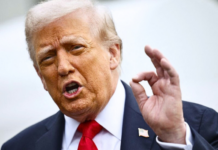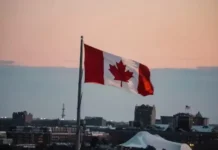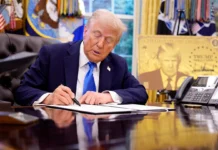Prime Minister Liz Truss resigned Thursday following a failed tax-cutting budget that rocked financial markets and which led to a revolt within her own Conservative Party.
Truss said in a statement outside Downing Street: “We set out a vision for a low-tax, high-growth economy that would take advantage of the freedoms of Brexit.”
“I recognize though, given the situation, I cannot deliver the mandate on which I was elected by the Conservative Party. I have therefore spoken to His Majesty the King to announce that I am resigning as leader of the Conservative Party.”
Her resignation follows a meeting with Graham Brady, the Conservative politician that is in charge of leadership votes and reshuffles. Brady chairs the 1922 Committee — the group of Conservative MPs without ministerial positions who can submit letters of no confidence in the prime minister.
Just before the meeting, a Downing Street spokesperson told reporters Truss wanted to stay in office.
During the hour the meeting lasted, the number of MPs publicly calling for Truss to step down reached 17. The number who have written letters to Brady expressing no confidence in the prime minister was reported to be over 100 by Thursday.
Truss said outside Downing Street that she and Brady had agreed the party would complete a leadership election within the next week.
The pound was up 0.4% on the day against the dollar shortly after the announcement, trading at $1.1273, briefly touching a session high. It remains at the level it was on Sept. 22, before Truss’ market-moving budget. The yields on 10-year and five-year gilts (U.K. sovereign bonds) we both down by around 5 basis points after Truss’ brief speech.
Opposition parties Labour, the Scottish National Party and the Liberal Democrats called for an immediate general election on Thursday afternoon. Labour leader Keir Starmer said: “The Conservative Party has shown it no longer has a mandate to govern.”
Source: CNBC















